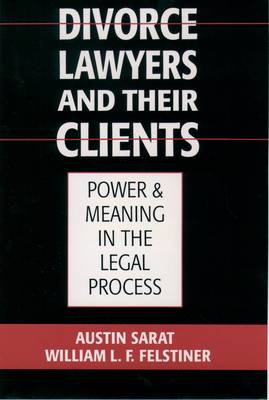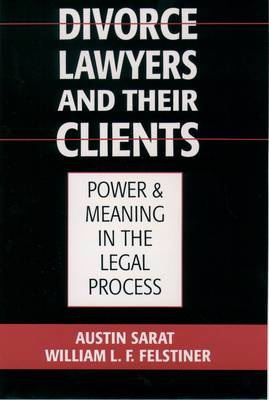
- Retrait gratuit dans votre magasin Club
- 7.000.000 titres dans notre catalogue
- Payer en toute sécurité
- Toujours un magasin près de chez vous
- Retrait gratuit dans votre magasin Club
- 7.000.0000 titres dans notre catalogue
- Payer en toute sécurité
- Toujours un magasin près de chez vous
Divorce Lawyers and Their Clients
Power and Meaning in the Legal Process
Austin Sarat, William L F Felstiner
Livre broché | Anglais
156,45 €
+ 312 points
Format
Description
Each year more than 2 million Americans get divorced, and most of them use a lawyer. In closed-door conversations between lawyers and their clients strategy is planned, tactics are devised, and the emotional climate of the divorce is established. Do lawyers contribute to the pain and emotional difficulty of divorce by escalating demands and encouraging unreasonable behavior? Do they take advantage of clients at a time of emotional difficulty? Can and should clients trust their lawyers to look out for their welfare and advance their long-term interests?
Austin Sarat and William L. F. Felstiner's new book, based on a pioneering and intensive study of actual conferences between divorce lawyers and their clients, provides an unprecedented behind-the-scenes description of the lawyer-client relationship, and calls into question much of the conventional wisdom about what divorce lawyers actually do. Divorce Lawyers and Their Clients suggests that most divorces are marked less by a pattern of aggressive advocacy than by one of inaction and drift. It uncovers reasons why lawyers find divorce practice frustrating and difficult and why clients frequently feel dissatisfied with their lawyers. This new work provides a unique perspective on the dynamics of professionalism. It charts the complex and shifting ways lawyers and clients "negotiate" their relationship as they work out the strategy and tactics of divorce.
Sarat and Felstiner show how both lawyers and clients are able to draw on resources of power to set the agenda of their interaction, while neither one is fully in charge. Rather, power shifts between the two parties; where it is achieved, power is found in the ability to have one's understandings of the social and legal worlds of divorce accepted. Power then works through the creation of shared meanings. Divorce Lawyers and Their Clients examines the effort to create such shared meanings about the nature of marriage and why marriages fail, the operation of the legal process, and the best way to bring divorces to closure. It will be fascinating reading for anyone who is going through a divorce, or has gone through one, as well as for lawyers, judges, and scholars of law and society.
Austin Sarat and William L. F. Felstiner's new book, based on a pioneering and intensive study of actual conferences between divorce lawyers and their clients, provides an unprecedented behind-the-scenes description of the lawyer-client relationship, and calls into question much of the conventional wisdom about what divorce lawyers actually do. Divorce Lawyers and Their Clients suggests that most divorces are marked less by a pattern of aggressive advocacy than by one of inaction and drift. It uncovers reasons why lawyers find divorce practice frustrating and difficult and why clients frequently feel dissatisfied with their lawyers. This new work provides a unique perspective on the dynamics of professionalism. It charts the complex and shifting ways lawyers and clients "negotiate" their relationship as they work out the strategy and tactics of divorce.
Sarat and Felstiner show how both lawyers and clients are able to draw on resources of power to set the agenda of their interaction, while neither one is fully in charge. Rather, power shifts between the two parties; where it is achieved, power is found in the ability to have one's understandings of the social and legal worlds of divorce accepted. Power then works through the creation of shared meanings. Divorce Lawyers and Their Clients examines the effort to create such shared meanings about the nature of marriage and why marriages fail, the operation of the legal process, and the best way to bring divorces to closure. It will be fascinating reading for anyone who is going through a divorce, or has gone through one, as well as for lawyers, judges, and scholars of law and society.
Spécifications
Parties prenantes
- Auteur(s) :
- Editeur:
Contenu
- Nombre de pages :
- 208
- Langue:
- Anglais
Caractéristiques
- EAN:
- 9780195117998
- Date de parution :
- 10-07-97
- Format:
- Livre broché
- Format numérique:
- Trade paperback (VS)
- Dimensions :
- 156 mm x 233 mm
- Poids :
- 317 g

Les avis
Nous publions uniquement les avis qui respectent les conditions requises. Consultez nos conditions pour les avis.






